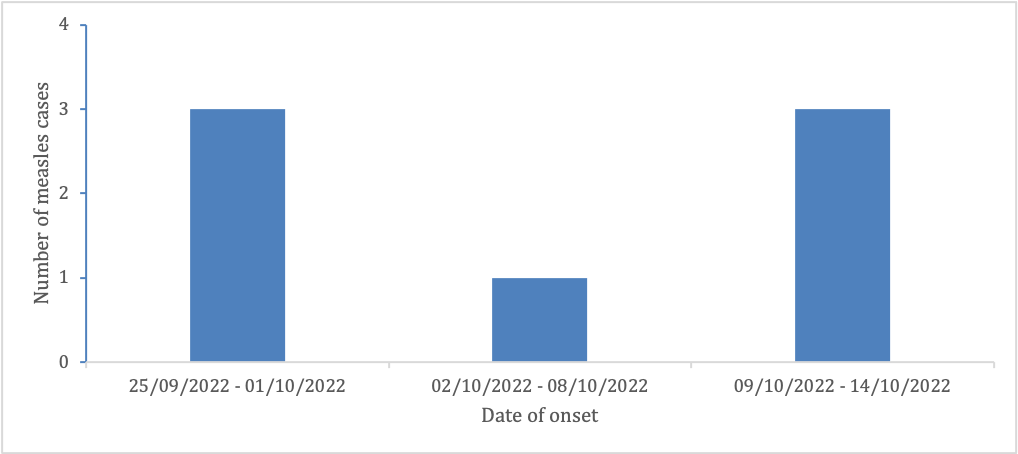On 11 October 2022, the National Institute for Communicable Diseases issued a measles alert after three measles cases were detected in Greater Sekhukhune District in Limpopo province within 30 days. Since the measles alert was issued, an additional four measles cases have been detected in the Greater Sekhukhune district, increasing the total number of measles cases to seven as of 21 October 2022 (Figure 1). (Note: Case counts may change as surveillance activities identify additional cases)

The ages of the measles-infected cases ranged from 9 months to 24 years (Figure 2), with three cases being male and four being female. One child was fully vaccinated for measles, with two measles doses given in 2019. One child with measles had not been vaccinated, and the other five measles cases had unknown vaccination history. One measles case was admitted to the hospital while one other had a complication that led to pneumonia.

Greater Sekhukhune District and Limpopo Province Department of Health officials, with the support of other stakeholders including the National Institute for Communicable Diseases, have started with public health response activities. These activities include enhanced surveillance for measles, contact tracing, screening for suspected measles cases using the measles case surveillance case definition followed by collection of blood and throat swabs for measles diagnostic testing, and medical record reviews in healthcare facilities to identify missed cases. Persons who have been exposed to suspected or confirmed cases are being vaccinated to prevent the spread of measles.
The measles immunisation coverage data for the Greater Sekhukhune district showed a decrease of 87% to 64% for measles dose 1 and 86% to 60% for measles dose 2 from 2017 to 2022. This is below the 95% coverage needed to achieve herd immunity. A survey is being done to validate the vaccination data provided to the province and investigate factors that might be contributing to the measles outbreak. Community awareness and health promotion by healthcare workers is continuing in the district to inform the public about the spread of measles and interventions to prevent disease. Measles vaccination has been initiated for children under 15 years to increase the measles immunity in the community and to prevent further spread of measles.
Clinicians should continue to be on the alert for measles cases, especially in Limpopo Province, as large measles outbreaks are occurring in sub-Saharan Africa, including in neighbouring countries. Measles is a highly contagious disease caused by a virus.
Signs and Symptoms
Patients with measles present with fever and a rash. The rash looks like small, red, flat spots over the body. The rash does not form blisters, nor is it itchy or painful. Other signs include cough, conjunctivitis (red eyes) and coryza (running nose). Complications of measles can include diarrhoea, dehydration, brain infection (encephalitis), blindness and death. Other measles complications are pneumonia, scarring of the cornea (kerato-conjunctivitis), and rarely encephalitis. Complications are more serious in those who catch measles as young infants (under 2 years of age) and in children who are malnourished. Measles is highly infectious and spreads rapidly from person to person. Persons of any age who are not vaccinated can catch measles and develop disease.
Clinicians and caregivers should check children’s road-to-health booklets to ensure measles vaccinations are up to date. Measles vaccines are given routinely at 6 and 12 months of age. It is never too late to vaccinate against measles. Suspected measles cases should be notified on the NMC system. Click here to access the Case Notification form
Source: Centre for Vaccine and Immunology, National Institute for Communicable Diseases ,Department of Health Limpopo province


